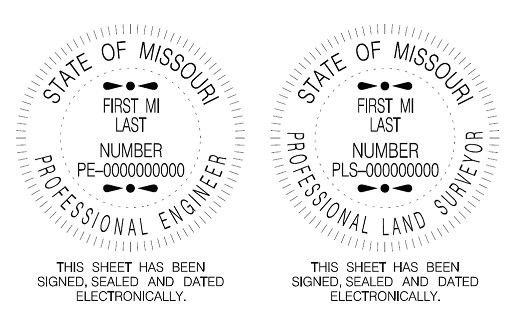237.11 Signing and Sealing

The responsible Registered Professional Engineer of the State of Missouri must sign, seal and date all submitted contract plans and job special provisions. The following is a summary of responsibilities.
- Transportation Project Manager – All MoDOT generated roadway contract plans (title sheet, all roadway related 2-B sheets, plan-profile sheets and cross section sheets, and roadway related special sheets generated in the district) and the roadway job special provisions index only.
- State Design Engineer - Roadway standard plans and any revised roadway standard plans.
- Chief Engineer – Standard specifications, General Special Provisions, and Supplemental Specifications.
- Structural Project Manager - All bridge related contract plan sheets and special sheets; the bridge special provisions index only.
- State Bridge Engineer - Bridge standard plans and any revised bridge standard plans.
- Consultants - All consultant-generated roadway or bridge contract plans and the job special provisions index only. Consultant-generated contract plans and JSPs do not require dual signing and sealing by MoDOT’s Transportation Project Manager.
- Area Engineer – All final (as-built) plans.
Should an error occur in any signed and sealed material after submittal, Design personnel will communicate with the project manager(s) to determine what corrective action is needed.
Plans must be electronically sealed via ProjectWise as a .pdf (Acrobat) file. Seals must be electronically applied so that if the document is modified, the seal is invalidated. Electronic seals must also contain text below the seal stating, “This sheet has been signed, sealed and dated electronically”. No image of engineers' seals shall become part of the native MicroStation drawing file.

When paper plans must be submitted, facsimile copies are not considered legal documents, and therefore will not be permitted originals for insertion into the proposal or plans. All signed and sealed documents must be hand-delivered or mailed to Central Office. The seal must be an ink seal, rather than an embossing seal. The signature must go through the seal, and must be dated.